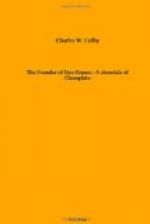This contrast is not to be interpreted to the personal disadvantage of Champlain. The slow growth and poverty of Quebec were due to no fault of his. It is rather the measure of his greatness that he was undaunted by disappointment and unembittered by the pettiness of spirit which met him at every turn. A memorial which he presented in 1618 to the Chamber of Commerce at Paris discloses his dream of what might be: a city at Quebec named Ludovica, a city equal in size to St Denis and filled with noble buildings grouped round the Church of the Redeemer. Tributary to this capital was a vast region watered by the St Lawrence and abounding ’in rolling plains, beautiful forests, and rivers full of fish.’ From Ludovica the heathen were to be converted and a passage discovered to the East. So important a trade route would be developed, that from the tolls alone there would be revenue to construct great public works. Rich mines and fat cornfields fill the background.
Such was the Quebec of Champlain’s vision—if only France would see it so! But in the Quebec of reality a few survivors saw the hunger of winter yield to the starvation of spring. They lived on eels and roots till June should bring the ships and food from home.
CHAPTER IV
CHAMPLAIN IN THE WILDERNESS
Champlain’s journeyings with the Indians were the holiday of his life, for at no other time was he so free to follow the bent of his genius. First among the incentives which drew him to the wilderness was his ambition to discover the pathway to China. In 1608 the St Lawrence had not been explored beyond the Lachine Rapids, nor the Richelieu beyond Chambly—while the Ottawa was known only by report. Beyond Lake St Louis stretched a mysterious world, through the midst of which flowed the Great River. For an explorer and a patriot the opportunity was priceless. The acquisition of vast territory for the French crown, the enlargement of the trade zone, the discovery of a route to Cathay, the prospect of Arcadian joys and exciting adventures—beside such promptings hardship and danger became negligible. And when exploring the wilderness Champlain was in full command. Off the coast of Norumbega his wishes, as geographer, had been subject to the special projects of De Monts and Poutrincourt. At Fontainebleau he waited for weeks and months in the antechambers of prelates or nobles. But when conducting an expedition through the forest he was lord and master, a chieftain from whose arquebus flew winged death.
The story of Champlain’s expeditions along these great secluded waterways, and across the portages of the forest, makes the most agreeable page of his life both for writer and reader, since it is here that he himself is most clearly in the foreground. At no point can his narrative be thought dull, compact as it is and always in touch with energetic action. But the details of fur trading at Tadoussac and the Sault St Louis, or even of voyaging along the Acadian seaboard, are far less absorbing than the tale of the canoe and the war party. Amid the depths of the interior Champlain reaped his richest experiences as an explorer. With the Indians for his allies and enemies he reached his fullest stature as a leader.




